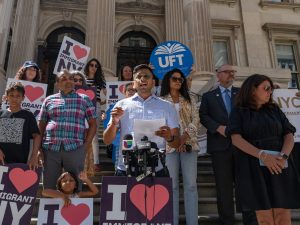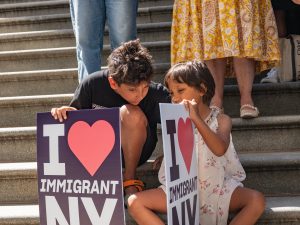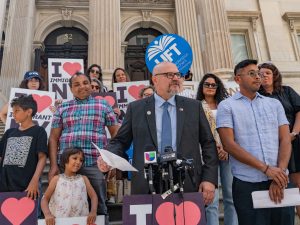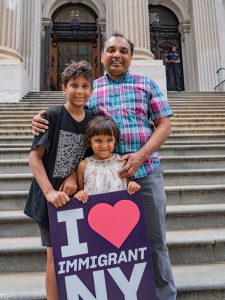
MOHAMED FARGHALY
mfarghaly@queensledger.com
On the eve of a new school year, advocates and immigrant families stood together Wednesday on the steps of the Tweed Courthouse to stress one message: schools remain safe places for all children. Immigrant advocates and community leaders gathered to share critical back-to-school resources and legal information for immigrant families facing heightened fears of deportation.
The New York Immigration Coalition (NYIC), alongside education advocates and immigrant New Yorkers, convened the press conference on August 27 to provide families with tools to navigate enrollment, access resources, and understand their rights as the new school year begins September 4.
The event comes as the Trump administration has escalated deportation and detention actions in New York City, raising concerns among immigrant families about whether it is safe to send their children to school.
“In the recent months, the Trump administration has escalated its mass deportation agenda towards the city, and immigrant New Yorkers, including some of our students, have been detained and kidnapped before attending court hearings and following the law,” said Vladimir Tlali, Senior Policy Strategist at NYIC. “These attacks on New York City families have fueled fear within our communities. Parents are worried that enrolling their children could expose their families to risk, and are questioning whether it be safe to send their children to school.”

The sense of urgency was underscored last week, when a 6-year-old girl from Queens and her mother were detained by Immigration and Customs Enforcement during a routine check-in at 26 Federal Plaza in Manhattan. The child, a student at P.S. 89 in Elmhurst, was deported to Ecuador with her mother within days, marking the first known ICE arrest of a New York City child under the age of 18 during President Donald Trump’s renewed immigration crackdown. The girl’s 19-year-old brother was also taken into custody and remains detained at the Delaney Hall facility in Newark, New Jersey.
At Wednesday’s press conference, advocates said such cases highlight why immigrant families need clear, accessible information and support as schools reopen. Tlali said the coalition sought to make one message clear: “schools remain safe places for learning.”
During the event, organizers provided families with information about school registration and enrollment, as well as resources affirming that all children, regardless of immigration status, have the right to a free public education. NYIC also distributed “Know Your Rights” kits and family preparedness plans to help families understand what to do if confronted by law enforcement or faced with the possibility of detention or deportation.
“For the Know Your Rights resources, community members have information available to them related with different types of immigration and law enforcement agents like who is who is, border patrol, local police, as well as advice on how to navigate different spaces and situations that immigrants may encounter,” Tlali said.
The family preparedness kits provide tools for parents to plan ahead in case of separation, including designating who can care for children, who can collect paychecks, and how to secure passports. Both kits are available through NYIC’s website.

On its website, the New York Immigration Coalition hosts a wide range of resources for families, from Know Your Rights materials — including wallet cards, guides for interactions with immigration and customs officers, and role-playing exercises — to family preparedness tools like forms for designating childcare or handling financial responsibilities in the event of detention or deportation. The site also features policy guides and workplace protections, health and safety information such as Medicaid access, postpartum coverage and mental health resources, as well as financial literacy and small business guides. These materials, available in multiple languages, are designed to give immigrant New Yorkers clear, practical information to navigate everything from school enrollment to legal enforcement encounters.
Tlali also emphasized that immigrant families should know their rights when enrolling their children in school. “Students, regardless of their immigration status, have the right to attend free public schools in the city,” he said. “Families have the right to receive information in a language that they can understand, and schools cannot collect information on immigration status.”
City resources such as the Department of Education’s multilingual websites, Family Welcome Centers, and programs like Open Arms are also available to provide direct enrollment assistance, housing support, and legal referrals for newly arrived families.
Tlali underscored the importance of continued support from schools and communities as immigrant families navigate the school year. “Parents should not have to choose between their child’s safety and their child’s education,” he said.



